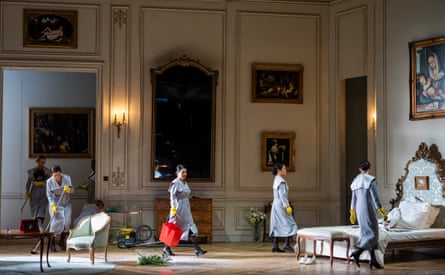In a week of yet more bad news at English National Opera, the long-awaited UK premiere of 7 Deaths of Maria Callas was a reminder of just how ambitious and outward-facing the company can be. Billed as “an opera project by Marina Abramović”, the piece is a co-production from six of Europe’s operatic big-hitters (ENO among them) and has been gradually doing the rounds since its world premiere in Munich in September 2020.
Its arrival in London – last stop on the circuit – attracted a large, confident crowd. “It’s one of those events”, murmured one older punter to her companion as they squeezed past me before curtain-up, hunting for somewhere to perch amid the sea of extravagant outfits and air-kissing. As the programme points out, Abramović is “the mother of performance art”.
Now 76 and the first female artist to be the subject of a major solo retrospective at the Royal Academy in London, Abramović’s work has consistently brought discomfort (her own and her audiences’) and danger (to herself). Be warned: anyone familiar with her loss-of-consciousness pieces or those deploying knives or bow and arrow might find her presence in 7 Deaths of Maria Callas tame.
For much of the work, Abramović lies in bed, eyes shut. She is Callas, dreaming on her deathbed of celebrated operatic deaths, all roles with which she was to some extent associated. As an aria from each is performed on stage by a singer, video projections – often slow-motion, all exquisitely shot – show an imagined scene starring Abramović as Callas, with disturbing murderous cameos by Willem Dafoe. In between, music by Serbian composer Marko Nikodijević provides atmospheric soundscapery – low rumbling, whistles, pulsing synth chords – as we hear a recording of Abramović’s voice. (Whether she’s speaking as Callas or the operatic character is sometimes hard to say, which is presumably the point.)

Finally, we move to the Paris hotel room where Callas died in 1977. Abramović is still in bed, now surrounded by Louis XIV furniture and oil paintings, electric lamps and plug sockets. She’s roused by a commanding voiceover (Abramović again), stands, walks, smashes a vase and leaves. The seven singers return as cleaners to clear up. The show ends with a recording of Callas herself singing Casta Diva, to which Abramović mimes.
And there’s the rub. The singers largely gave decent performances of their greatest-hits arias: the superb Aigul Akhmetshina’s turn as Carmen was a highlight, while Elbenita Kajtazi’s Vissi d’Arte was lush and Eri Nakamura’s Addio, del Passato creamy and generous. But none, inevitably, were Callas. Hearing the Greek soprano’s own unmistakeable voice – its gloriously weird patina; its vulnerability up high; its covered richness lower down – made only too clear the absence at the work’s centre.
At Coliseum, London, until 11 November